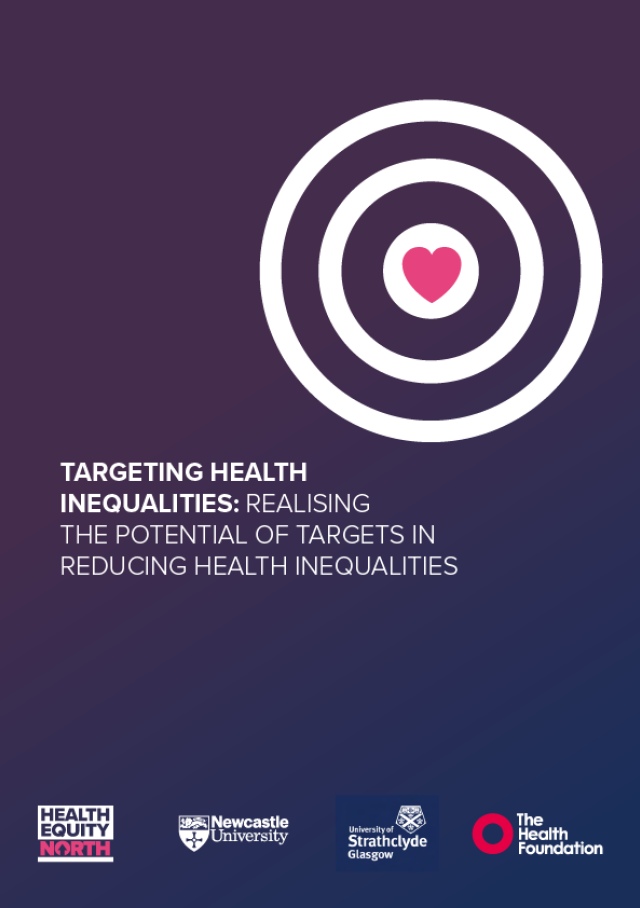Targeting health inequalities - realising the potential of targets in addressing health inequalities A report commissioned by the Health Foundation and produced by the University of Newcastle and University of Strathclyde in partnership with Health Equity North
September 2023

Key points
-
There are stark health inequalities in the UK, with a difference in life expectancy of 11 years for men and 8 years for women between the richest and poorest local authorities. The reasons are complex and driven by a range of factors. As a result, responsibility for addressing health inequalities sits across many government departments.
-
The UK has a history of using health inequalities targets in policy. The English health inequalities targets of 1997–2010 were at least partially achieved, with inequalities in life expectancy and infant mortality rates decreasing.
-
The report also reviews the use of health inequalities targets by the devolved nations and the Conservative government’s aim to ‘level up’ health.
-
Improving the health of the most disadvantaged groups and areas (eg the 20% most deprived areas, children and minority ethnic groups) is likely to be the most effective approach. Experience suggests that it takes around 10 years of concerted action to achieve measurable reductions in health inequalities.
-
The report identifies 6 health indicators — infant mortality rates, life expectancy, healthy life expectancy, prevalence of overweight and obesity in adults and children, prevalence of anxiety and depression in adults, and suicide rates — as a suitable basis for targets.
-
The report also identifies 6 interim indicators of social and behavioural determinants of health — household relative poverty rates, employment rates, relative child poverty rates, educational attainment rates (5+ GCSEs grades A*–C), meeting recommended physical activity rates, and consuming five or more fruit and vegetables per day — that could be used to track progress.
-
Targets should be ambitious but achievable and to meet them will require adequate resources, policy action and political leadership.
Whoever forms the next government will be leading a country in which improvements in life expectancy have stalled and where the health of the poorest communities has got worse. This undermines the economy and public services, as well as our health and wellbeing.
This report commissioned by the Health Foundation and produced by the University of Newcastle and University of Strathclyde in partnership with Health Equity North examines how targets have been used in the past to address health inequalities and how they could be used in the future. It is part of an area of work by the Health Foundation examining how policymakers can take a whole-government approach to improving health.
Although there are challenges with designing and using targets effectively, this research shows that targets have played an important role in driving action to tackle health inequalities and in benchmarking progress. Targets therefore have an important role to play as part of any future strategy to address the wider determinants of health. This report gives clear guidance to policymakers across the four nations of the UK, considering how to develop well-evidenced targets and interim measures to address health inequalities.
Cite this publication
Further reading
Work with us
We look for talented and passionate individuals as everyone at the Health Foundation has an important role to play.
View current vacanciesThe Q community
Q is an initiative connecting people with improvement expertise across the UK.
Find out more


